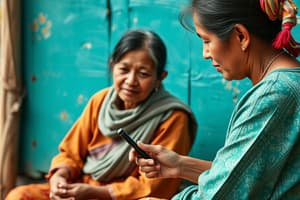Podcast
Questions and Answers
Quale es le prime passaggio in le methodo de deduction?
Quale es le prime passaggio in le methodo de deduction?
- Observation
- Theory (correct)
- Confirmation
- Hypothesis
In le methodo de induction, qual option es le ultime passaggio?
In le methodo de induction, qual option es le ultime passaggio?
- Pattern
- Theory (correct)
- Observation
- Hypothesis
Qual de iste duo methodos es principalmente quantitative?
Qual de iste duo methodos es principalmente quantitative?
- Deduction (correct)
- Induction
- Observation
- Confirmation
Le methodo de induction comincia con qual passaggio?
Le methodo de induction comincia con qual passaggio?
Qual es le correct sequenza de passagios in le methodo de deduction?
Qual es le correct sequenza de passagios in le methodo de deduction?
What is the initial step in the deduction research method?
What is the initial step in the deduction research method?
Which approach emphasizes the development of theory from observed patterns?
Which approach emphasizes the development of theory from observed patterns?
According to the induction method, what follows after the observation phase?
According to the induction method, what follows after the observation phase?
In the deduction method, what is the final step in the research process?
In the deduction method, what is the final step in the research process?
Which of the following best represents the difference between deduction and induction?
Which of the following best represents the difference between deduction and induction?
Flashcards
Deduction (quantitative)
Deduction (quantitative)
Method of research that starts with a theory, forms a hypothesis, makes observations, and then confirms or refutes the hypothesis.
Induction (qualitative)
Induction (qualitative)
Method of research that starts with observations, identifies patterns, develops a hypothesis based on these patterns, and then creates a theory.
Deductive Reasoning
Deductive Reasoning
Process of reasoning from general to specific statements.
Inductive Reasoning
Inductive Reasoning
Signup and view all the flashcards
Quantitative Research
Quantitative Research
Signup and view all the flashcards
Deduction
Deduction
Signup and view all the flashcards
Induction
Induction
Signup and view all the flashcards
Hypothesis
Hypothesis
Signup and view all the flashcards
Study Notes
Sociological Research Methods
- Deduction (quantitative) uses theory to form hypotheses, tested through observation.
- Induction (qualitative) involves observation to generate theories.
- Research designs vary, with quantitative studies focusing on numerical data and larger samples, and qualitative studies delving into individual experiences and smaller samples.
- Mixed methods combine both approaches.
- Data collection methods include surveys, interviews, participant observation, questionnaires, experiments, and ethnography.
Socialization
- Nature vs. nurture debate: historically, two theories exist – a biological approach (emphasizing genetics) and an environmental/socialization approach (stressing the social environment).
- Socialization is a lifelong process, most intensive during early childhood, influenced by factors like gender, ethnicity, social class, and social environment.
- Socialization involves acquiring identity (self-concept), internalizing social expectations (rules, norms, etc.) through social interactions, roles and norms.
- Primary socialization occurs in early years within families, establishing the basis for later social development.
- Secondary socialization takes place after childhood, influencing attitudes, beliefs, and roles through interactions in various social settings.
Media and Resocialization
- Media greatly impacts perceptions of individuals/groups, affecting our interactions and understanding of the world.
- Resocialization involves significant changes in people's behaviour and beliefs brought about by new circumstances.
- Voluntary resocialization occurs by individual choice, for example, joining a religious community.
- Involuntary resocialization occurs against someone's will, as might happen in a prison.
Sex and Gender
- Sex is biologically based, referring to physical characteristics, while gender is socially constructed, referring to roles and expectations associated with the different sexes.
- Gender is often associated with binary opposites: masculinity and femininity, but there are varied and fluid concepts of gender and sex beyond the traditional binary.
- Gender is socially constructed and influenced by factors such as culture, society, and the media.
Social Inequality
- Social inequality refers to unequal distribution of opportunities and resources among different members of society.
- Two main ways to measure social inequality are inequality in opportunities and inequality in conditions (referring to income, wealth, etc.), and are based on various social structures (e.g., gender, race, ethnicity, and class).
Social Determinants of Health
- Social determinants of health are factors influenced by societal wealth distribution and impact health inequalities within and between countries.
Crime
- Certain actions and behaviors (i.e., criminal acts) require social control and intervention, as codified in legal frameworks like the criminal code.
Intersectionality
- Social identities are not separate, but interconnected. Social movements, which advocate for various groups, can have different impacts on public health.
- Race, ethnicity, and sexual identity are factors shaping human identities, impacting social interactions and societal structures.
Studying That Suits You
Use AI to generate personalized quizzes and flashcards to suit your learning preferences.
Related Documents
Description
Este quiz explora los metodos de investigation sociologica, incluyendo a deduccion e induccion. Discute como os disenos de investigacion varian entre quantitatve e qualitativo. En plus, aborda le debate de natura contra nutrimento e le processus de socialisation.




